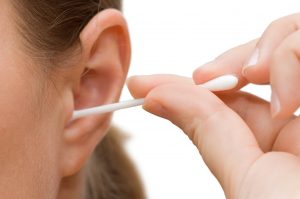 Forget what you thought you knew about cleaning your ears! Research has refuted the common belief that you should poke and dig out the wax and debris.
Forget what you thought you knew about cleaning your ears! Research has refuted the common belief that you should poke and dig out the wax and debris.
Cottons swabs – or pens, pencils, paper clips, bobby pins, etc. – should not be used to clean your ears. Yes, you’ve read that correctly, these devices can cause you much more harm than relief from wax build-up.
Advertisement
So I’m doing my duty and spreading the word: Don’t put anything in your ears, please! But now you ask, how can you clean them? Well, let’s first examine the harmful effects of swabbing, digging and dabbing.
RELATED READING: Can your weight be the cause of your hearing loss?
Results are in: Do not swab
A study by Henry Ford Hospital in the United States examined the outcome of cleaning your ears with a cotton swab. Researchers looked at the medical records of 1,540 patients of an otolaryngology (ear, nose and throat) clinic who had experienced ear ruptures in the years 2001 to 2010. They discovered that more than half these patients were using cotton swabs to clean their ears. This group was further divided into two – observation and surgery.
In the surgery group, patients’ eardrums were so damaged that it was causing facial paralysis, also known as tympanic membrane perforations (TMP). Within the observation group, the rupture eventually repaired itself over several months.
As another word of caution, other results of a damaged ear are vertigo, ringing in the ears, dizziness and, ultimately, hearing loss.
How to clean your ears (properly)
The rate of wax build-up is different for everyone. It’s still important to remove wax because it can cause a decreased ability to hear or even pain. But if we can’t stick something in our ears, how can we possibly get it out? Dr. Michael Seidman, co-author of the hospital study, set out a few guidelines and recommendations on how to achieve better hearing without harm, which I’d like to pass along:
Take cool peroxide, hot tap water and mix equally. Be sure it is body temperature and gently irrigate the ear one or two times per month.
Take plain vinegar and water and use four or five drops in the ear once a week.
Advertisement
See a doctor, who can remove ear wax for you.
Use an over-the-counter product to assist in the dissolving of the wax.
These steps will not only ensure your ears stay clear, but you will also prevent injury to your hearing. So before you reach for that swab (or alternative sharp object, ouch!) take the time to nurture your ears and protect your hearing.
RELATED READING: New weight loss treatment that isn’t a diet!
